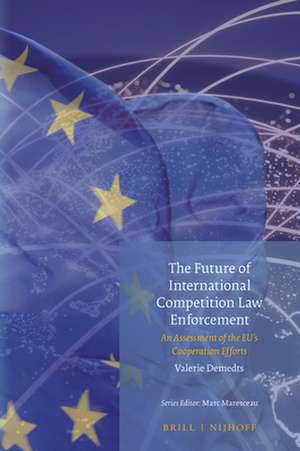The Future of International Competition Law Enforcement: An Assessment of the EU’s Cooperation Efforts: Studies in EU External Relations, cartea 14
Autor Valerie Demedtsen Limba Engleză Hardback – 24 oct 2018
Din seria Studies in EU External Relations
- 18%
 Preț: 1067.84 lei
Preț: 1067.84 lei - 18%
 Preț: 743.85 lei
Preț: 743.85 lei - 18%
 Preț: 835.84 lei
Preț: 835.84 lei - 18%
 Preț: 946.17 lei
Preț: 946.17 lei - 18%
 Preț: 819.18 lei
Preț: 819.18 lei - 18%
 Preț: 966.36 lei
Preț: 966.36 lei - 18%
 Preț: 883.07 lei
Preț: 883.07 lei - 18%
 Preț: 880.34 lei
Preț: 880.34 lei - 18%
 Preț: 887.33 lei
Preț: 887.33 lei - 18%
 Preț: 861.74 lei
Preț: 861.74 lei - 18%
 Preț: 1361.28 lei
Preț: 1361.28 lei - 18%
 Preț: 1124.50 lei
Preț: 1124.50 lei - 18%
 Preț: 1004.97 lei
Preț: 1004.97 lei - 18%
 Preț: 828.30 lei
Preț: 828.30 lei - 18%
 Preț: 869.81 lei
Preț: 869.81 lei - 18%
 Preț: 923.78 lei
Preț: 923.78 lei - 18%
 Preț: 942.39 lei
Preț: 942.39 lei
Preț: 872.40 lei
Preț vechi: 1063.90 lei
-18% Nou
Puncte Express: 1309
Preț estimativ în valută:
166.93€ • 174.29$ • 138.16£
166.93€ • 174.29$ • 138.16£
Carte indisponibilă temporar
Doresc să fiu notificat când acest titlu va fi disponibil:
Se trimite...
Preluare comenzi: 021 569.72.76
Specificații
ISBN-13: 9789004372955
ISBN-10: 9004372954
Dimensiuni: 155 x 235 mm
Greutate: 0.75 kg
Editura: Brill
Colecția Brill | Nijhoff
Seria Studies in EU External Relations
ISBN-10: 9004372954
Dimensiuni: 155 x 235 mm
Greutate: 0.75 kg
Editura: Brill
Colecția Brill | Nijhoff
Seria Studies in EU External Relations
Cuprins
AcknowledgementsList of AbbreviationsIntroduction: Ready, Willing, and Able?PART 1Trial and Error in the Development of International Competition Law Enforcement Cooperation1 Need for International Competition Cooperation1.1 Globalisation 1.2 Proliferation of Competition Laws and Increase in Enforcement Activity2 Four Axes of International Competition Cooperation2.1 Multilateralism v Bilateralism 2.2 Enforcement Cooperation v Convergence/Harmonisation 2.3 Formal v Informal Cooperation 2.4 Hard v Soft Law3 Origins of International Competition Cooperation3.1 External Events Overthrew Early Multilateral Initiatives 3.2 Extraterritoriality Emerged as Default Solution 3.3 Multilateral Efforts Continue to Fail 3.4 The OECD Recommendations and the Switch to the Bilateral Level4 Intermediate Conclusion Part 1PART 2An Assessment of the EU’s Dedicated Competition Cooperation Agreements1 Benchmarks1.1 Introduction 1.2 Measurable Benchmarks2 First Generation Agreements: A Costly Way to Create and Maintain Momentum2.1 Context of Conclusion of the EU-US Agreement 2.2 Cooperation Mechanisms in the EU-US Agreement 2.3 Legal Nature 2.4 Use of the EU-US Agreements 2.5 Assessment3 Second Generation Agreements: Ignoring Crucial Issues3.1 A Strong Call for Intensified Cooperation 3.2 The EU-Switzerland Second Generation Agreement 3.3 Limited Use of Existing Second Generation Agreements 3.4 A Particular Challenge: The Concept of ‘Confidential Information’ 3.5 Concerns About the Exchange of Confidential Information and How They are Addressed by the EU-Switzerland Agreement 3.6 Assessment Based on Benchmarks4 Alternatives and Complements: Workable or Not?4.1 Alternative Cooperation Mechanisms in the Field of Competition Law 4.2 Cooperation in Other Policy Fields5 Intermediate Conclusion Part 2PART 3Dedicated Agreements versus Integration in a Broader Framework1 Substantive Integration: Competition in the Global Trade System—A Cautionary Tale1.1 Relevance and Scope 1.2 Emergence of Competition Chapters in FTAS 1.3 Competition Chapters in Bilateral EU FTAS: From Traditional FTASOver Post-Global Europe FTAS to Mega-FTAS 1.4 The Rationale for Inclusion: Pro’s and Con’s2 Geographical Integration: The Multilateral Approach2.1 Different Multilateral Forums with Distinct Challenges3 Intermediate Conclusion Part 3Conclusion: Ready, but not Willing or AbleSelected BibliographyIndex
Notă biografică
Valerie Demedts defended her PhD on 23 October 2017 at Ghent University, Belgium. Currently she works as a case handler for the Belgian Competition Authority. She published many articles relating to international cooperation in competition law enforcement sensu lato.
